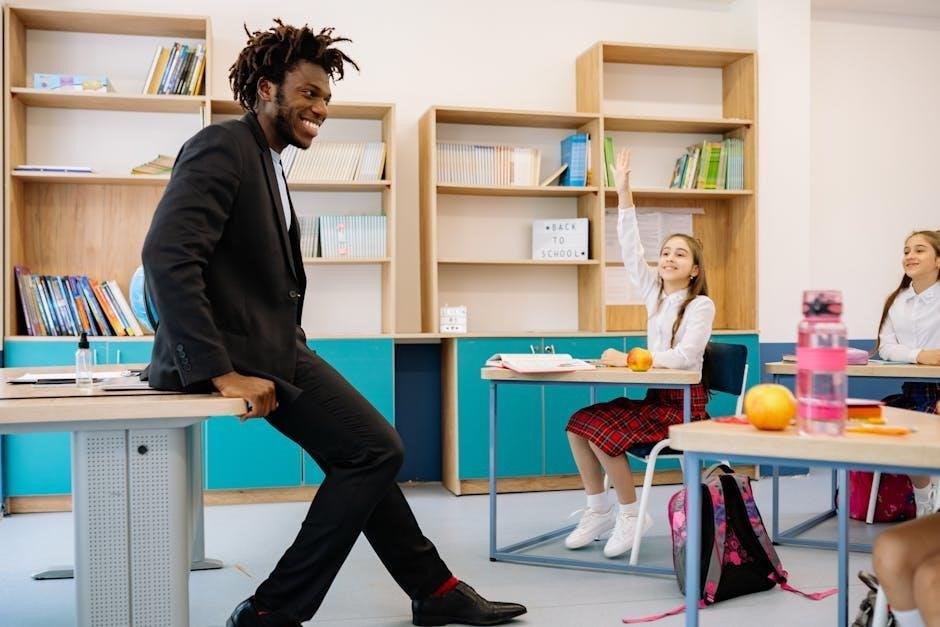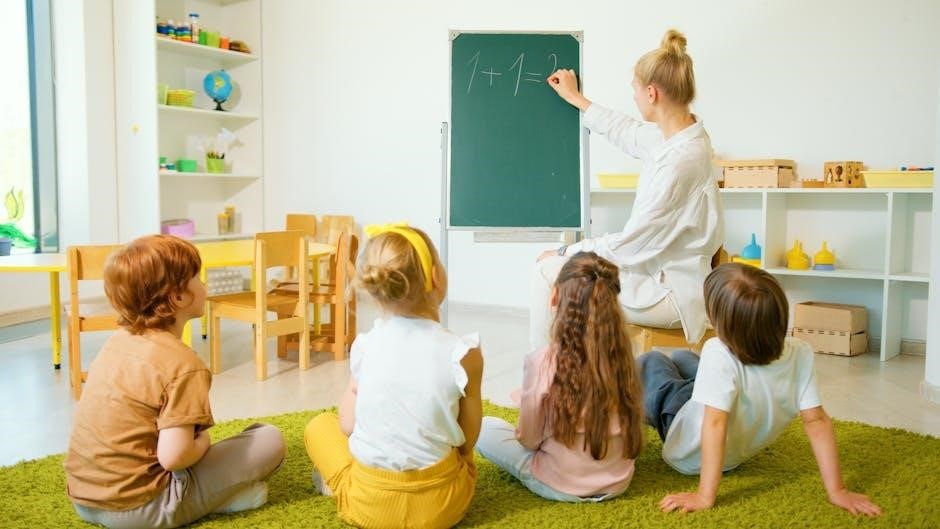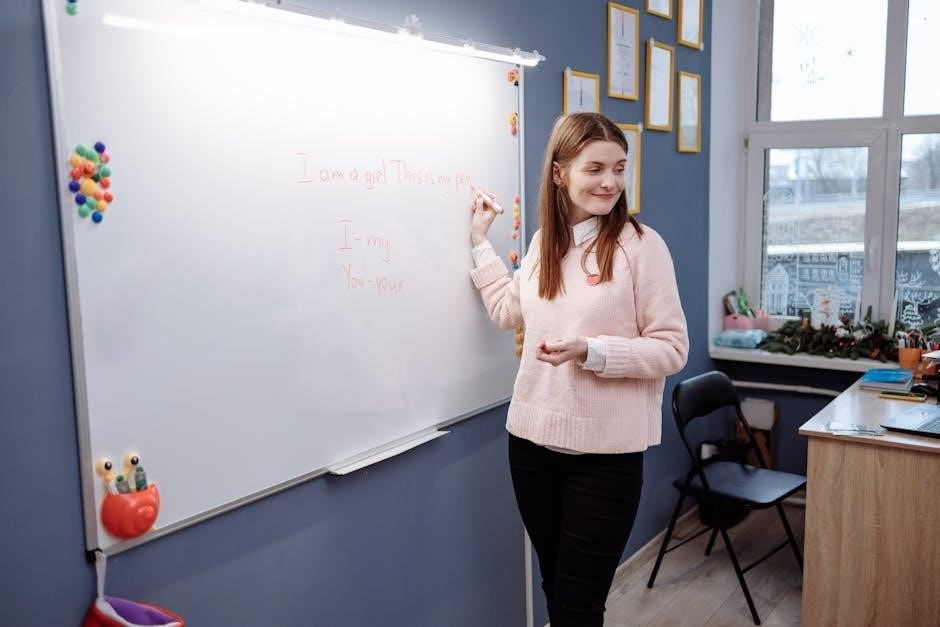lesson plans for 1-2 year olds pdf
Lesson plans for 1-2 year olds focus on fostering creativity, motor skills, and social-emotional growth through play-based activities. These structured yet flexible plans emphasize age-appropriate goals and hands-on exploration.
Importance of Early Childhood Education
Early childhood education is crucial for the holistic development of 1-2 year olds, as it lays the foundation for future learning and life success; During this stage, children experience rapid brain development, making it an ideal time to nurture cognitive, social, and emotional growth. Structured play and engaging activities in lesson plans help build curiosity, creativity, and essential life skills. These experiences foster independence, self-confidence, and emotional intelligence, which are vital for long-term personal and academic achievement. Additionally, early education helps children develop language skills, motor abilities, and problem-solving capacities through interactive and age-appropriate practices. By introducing lessons that encourage exploration and social interaction, educators can create a nurturing environment that supports children’s natural curiosity and readiness to learn. Consistent, high-quality early education ensures a strong start, preparing toddlers for future challenges and fostering a lifelong love for learning.
Key Characteristics of 1-2 Year Old Learners
Children aged 1-2 years are naturally curious and thrive in environments that encourage exploration and discovery. At this stage, they are beginning to develop language skills, with vocabulary expanding rapidly. Their understanding of the world is rooted in sensory experiences, as they rely heavily on sight, sound, touch, and movement to learn. Motor skills are still emerging, with improvements in balance, coordination, and fine motor abilities. Toddlers in this age group are also beginning to assert independence, testing boundaries while seeking guidance. Their attention spans are short, requiring lessons to be engaging and brief. Socially, they are learning to interact with peers, though parallel play is common. Emotionally, they are developing self-awareness and beginning to understand simple cause-and-effect relationships. These characteristics highlight the need for lesson plans that are interactive, flexible, and centered on playful, hands-on experiences to cater to their unique developmental needs.

Creating Effective Lesson Plans for Toddlers
Effective toddler lesson plans incorporate sensory play, motor skill development, and emotional intelligence. They emphasize flexibility, short intervals, and hands-on activities tailored to their developmental stages and curiosity-driven learning styles.
Age-Specific Activities and Goals
Lesson plans for 1-2 year olds should prioritize play-based learning, focusing on activities that promote sensory exploration, motor skill development, and language acquisition. Activities like stacking toys, finger painting, and storytime encourage creativity and coordination. Goals include improving fine motor skills, enhancing vocabulary, and fostering curiosity. Simple, repetitive tasks help toddlers develop problem-solving abilities and hand-eye coordination. Sensory bins and texture play are excellent for stimulating curiosity and exploration. Music and movement activities, such as clapping or marching, support rhythm awareness and gross motor development. Language goals can be met through nursery rhymes, simple stories, and interactive conversations. These activities are designed to align with the natural curiosity and energy of toddlers, ensuring learning is engaging and developmentally appropriate.
Aligning Lesson Plans with Developmental Milestones
Lesson plans for 1-2 year olds must align with key developmental milestones to ensure activities are age-appropriate and effective. At this stage, toddlers are mastering physical skills like sitting, standing, and walking, as well as cognitive abilities such as problem-solving and object permanence. Lesson plans should incorporate activities that support these milestones, such as stacking toys for fine motor skills or sensory play for exploration. Language development can be nurtured through nursery rhymes, simple stories, and interactive conversations. Social-emotional growth is also crucial, with activities fostering sharing, empathy, and independence. By tailoring lessons to these milestones, educators can create a nurturing environment that encourages holistic development. Flexibility is key, as plans should adapt to individual progress and interests, ensuring each child thrives at their own pace.

Popular Subjects for Toddler Lesson Plans
Popular subjects include sensory play, motor skills, language, and social-emotional learning, fostering curiosity and development through engaging, age-appropriate activities.
Sensory Play and Exploration
Sensory play is a cornerstone of toddler development, fostering curiosity and motor skills. Activities like texture exploration, sensory bins, and art projects engage young learners, encouraging creativity and discovery. These hands-on experiences help toddlers understand their environment, enhancing early learning through interactive and immersive methods. Sensory play also supports fine motor development, hand-eye coordination, and problem-solving abilities. By incorporating materials like sand, water, and play dough, lesson plans cater to natural curiosity, making learning fun and effective. Sensory exploration is not just play—it’s a vital tool for cognitive and emotional growth, preparing toddlers for future academic success. These activities are designed to be safe, age-appropriate, and adaptable, ensuring every child can participate and thrive.
Motor Skills Development
Motor skills development is a critical focus in lesson plans for 1-2 year olds, emphasizing activities that enhance both gross and fine motor abilities. Gross motor skills, such as walking, running, and jumping, are strengthened through games like obstacle courses and balance challenges. Fine motor skills, like grasping and manipulating objects, are nurtured with activities involving stacking blocks, using large crayons, or playing with play dough. These exercises improve hand-eye coordination, dexterity, and overall physical control. Structured play, such as crawling through tunnels or climbing soft stairs, further supports muscle development and coordination. By incorporating these activities, lesson plans help toddlers master essential movements, laying a foundation for future physical and cognitive growth. Motor skills development is not just about movement—it’s about building confidence and independence in young learners.
Language and Communication
Language and communication skills are foundational in lesson plans for 1-2 year olds, focusing on vocabulary expansion, phonological awareness, and expressive abilities. Activities like interactive storytelling, rhyme repetition, and sing-alongs foster an understanding of sounds and words. Simple, clear instructions and labeling objects during play help toddlers connect words to meanings. Encouraging verbal and non-verbal communication, such as gestures and facial expressions, promotes self-expression. Group conversations and role-playing games also enhance listening and speaking skills. These activities are designed to create engaging, immersive environments where toddlers can explore and practice language naturally. By incorporating these strategies, lesson plans support young learners in building a strong foundation for future communication and literacy skills, making language development both fun and meaningful. Structured yet flexible, these plans cater to individual developmental levels, ensuring every child progresses at their own pace.

Beyond Academics: Social-Emotional Learning
Social-emotional learning focuses on nurturing empathy, self-awareness, and emotional regulation in toddlers through interactive play and group activities, fostering healthy relationships and emotional intelligence from an early age.
Building Emotional Intelligence
Building emotional intelligence in 1-2 year olds involves teaching them to recognize, understand, and manage their emotions. Through simple, engaging activities like storytelling and role-playing, toddlers learn to identify feelings and develop empathy. Caregivers can use labeled emotions, encouraging children to express their feelings verbally. Positive reinforcement, such as praising calm behavior, helps toddlers regulate emotions. Activities like sharing toys or taking turns foster cooperation and self-awareness. These early lessons lay the foundation for healthy relationships and emotional resilience, empowering young learners to navigate social interactions confidently. By integrating emotional intelligence into daily routines, caregivers provide a strong base for lifelong emotional well-being and social success. These strategies are essential for fostering a supportive and nurturing environment during early childhood development.
Encouraging Social Interaction
Encouraging social interaction in 1-2 year olds is crucial for their development, as it fosters cooperation, empathy, and communication skills. Simple group activities, like sharing toys or collaborative play, promote bonding and mutual respect. Play-based learning encourages toddlers to engage with peers, learning to take turns and resolve conflicts. Caregivers can model positive interactions, teaching children to use gestures and words to express needs. Structured games, such as rolling a ball or stacking blocks together, help toddlers understand social norms. Group songs and dances also create opportunities for shared experiences, building a sense of community. These activities not only enhance social skills but also prepare young learners for future relationships and collaborative environments. By prioritizing social interaction, caregivers help toddlers develop essential life skills in a nurturing and engaging way. This foundation is vital for their emotional and social growth.

Practical Tools and Resources
Explore free PDF templates, activity guides, and digital platforms designed to simplify lesson planning for 1-2 year olds, ensuring engaging and developmentally appropriate activities.
Free PDF Templates for Toddler Lesson Plans
Discover a variety of free PDF templates designed specifically for creating toddler lesson plans. These templates offer a structured yet flexible framework to organize daily activities, sensory play, and motor skill development. Many templates include sections for learning objectives, activity timelines, and space for notes, making it easy to track progress. They are tailored to meet the unique needs of 1-2 year olds, focusing on play-based learning and developmental milestones. Educators can customize these templates to suit their classroom environment and the individual needs of their students. Websites like StoryboardThat and Education.com provide accessible downloads, ensuring educators can save time while delivering engaging and age-appropriate lessons. These resources are ideal for both experienced teachers and those new to early childhood education, offering a practical tool to enhance learning experiences for young children.
Digital Platforms for Lesson Planning
Digital platforms like StoryboardThat and Education.com offer comprehensive tools for creating and managing toddler lesson plans. These platforms provide interactive activities, customizable templates, and resources tailored to early childhood education. Educators can access a wide range of pre-designed lesson plans aligned with developmental milestones, such as sensory play and motor skills development. Many platforms allow for real-time collaboration, enabling teachers to share ideas and adapt plans to meet diverse needs. Additionally, digital tools often include progress-tracking features, making it easier to monitor a child’s growth. These platforms are user-friendly, catering to both experienced educators and those new to lesson planning. By leveraging digital resources, teachers can create engaging, structured, and age-appropriate lesson plans that foster creativity and learning in young children. These tools are invaluable for enhancing the quality and effectiveness of early childhood education.

Lesson plans for 1-2 year olds emphasize creativity, growth, and exploration, providing a foundation for early learning through structured play and age-appropriate activities.
The Impact of Structured Play on Early Learning
Structured play is a catalyst for creativity and motor skill development in toddlers. It encourages problem-solving, social interaction, and emotional intelligence through hands-on activities. These playful experiences, aligned with developmental milestones, foster curiosity and independence. By engaging in sensory play, art projects, and storytelling, young learners build foundational skills. Play-based lessons also enhance language development and cognitive growth, making learning meaningful and enjoyable. Structured play provides a nurturing environment where toddlers can explore, experiment, and learn at their own pace. It lays the groundwork for future academic success and emotional well-being, ensuring a strong start in early childhood education.
Adapting Lesson Plans for Diverse Needs
Adapting lesson plans for diverse needs ensures inclusivity and effectiveness in early childhood education. Every child develops at their own pace, with unique learning styles and abilities. Teachers can modify activities to accommodate different developmental stages, incorporating sensory-friendly techniques or visual aids for visual learners. For children with special needs, assistive tools or alternative methods can be integrated seamlessly. Flexibility is key, allowing educators to adjust goals and strategies based on individual progress. By personalizing lesson plans, teachers foster an environment where every child feels supported and challenged appropriately. Regular observation and feedback help refine these adaptations, ensuring each child’s needs are met. This tailored approach promotes engagement, confidence, and overall developmental growth, making learning accessible and enjoyable for all toddlers.


